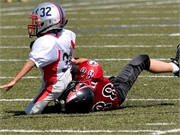Playing Football at Young Age Doesn't Slow Concussion Recovery in College

WEDNESDAY, Sept. 9, 2020 (HealthDay News) -- Playing tackle football at an early age doesn't determine how quickly college players recover from a concussion, a new study finds.
"Because football is a very physical game and concussions can occur, it has been hypothesized that playing at an early age may interfere with neurodevelopmental growth and increase a person's vulnerability to neurological problems later in life," said researcher Thomas Buckley, of the University of Delaware.
However, "our study in NCAA football players, some who started playing tackle football as early as age 5, found no link between playing football earlier in life and worse recovery from concussion," Buckley said.
For the study, the researchers collected data on more than 600 football players from 30 schools as part of the NCAA-Department of Defense Concussion Assessment, Research and Education Consortium. Players started playing the game at an average age of 10.
All those in the study had a recent concussion and were tested before their concussion and evaluated within six hours after the concussion.
Nearly 300 participants were evaluated for the severity of their symptoms one to two days after concussion, and more than 300 were evaluated after their symptoms stopped.
About 46% of the athletes had experienced concussions before.
Tests included assessments for concussion severity and recovery including memory, reaction time, speed of eye movements, and a balance test. The players were also asked about the severity of their symptoms.
No evidence was found that those who started playing tackle football at an earlier age had longer recovery times, poorer performance on thinking and memory tests, poorer balance or more psychological problems, the researchers said.
The report was published online Sept. 9 in the journal Neurology.
"It's encouraging that our study found no link between earlier exposure to playing tackle football in childhood and adolescence and worse outcomes after concussion while still in college," Buckley said in a journal news release.
"Our results may be reassuring for players and parents, but it is important to note that we were looking at one concussion at one point in time and current testing may not be sensitive enough to detect subtle changes. Larger studies are needed to evaluate recovery from multiple concussions when people get older," he said.
More information
For more on concussion, see the U.S. Centers for Disease Control and Prevention.

The news stories provided in Health News and our Health-E News Newsletter are a service of the nationally syndicated HealthDay® news and information company. Stories refer to national trends and breaking health news, and are not necessarily indicative of or always supported by our facility and providers. This information is provided for informational and educational purposes only, and is not intended to be a substitute for medical advice, diagnosis, or treatment.

